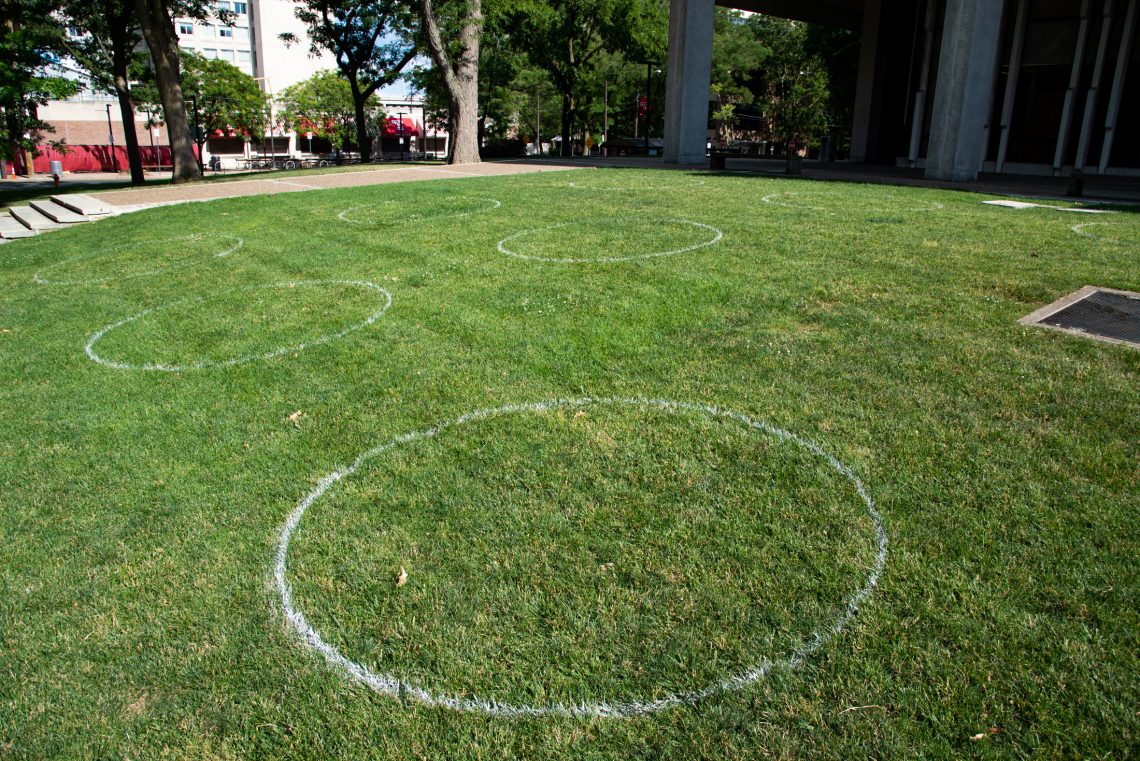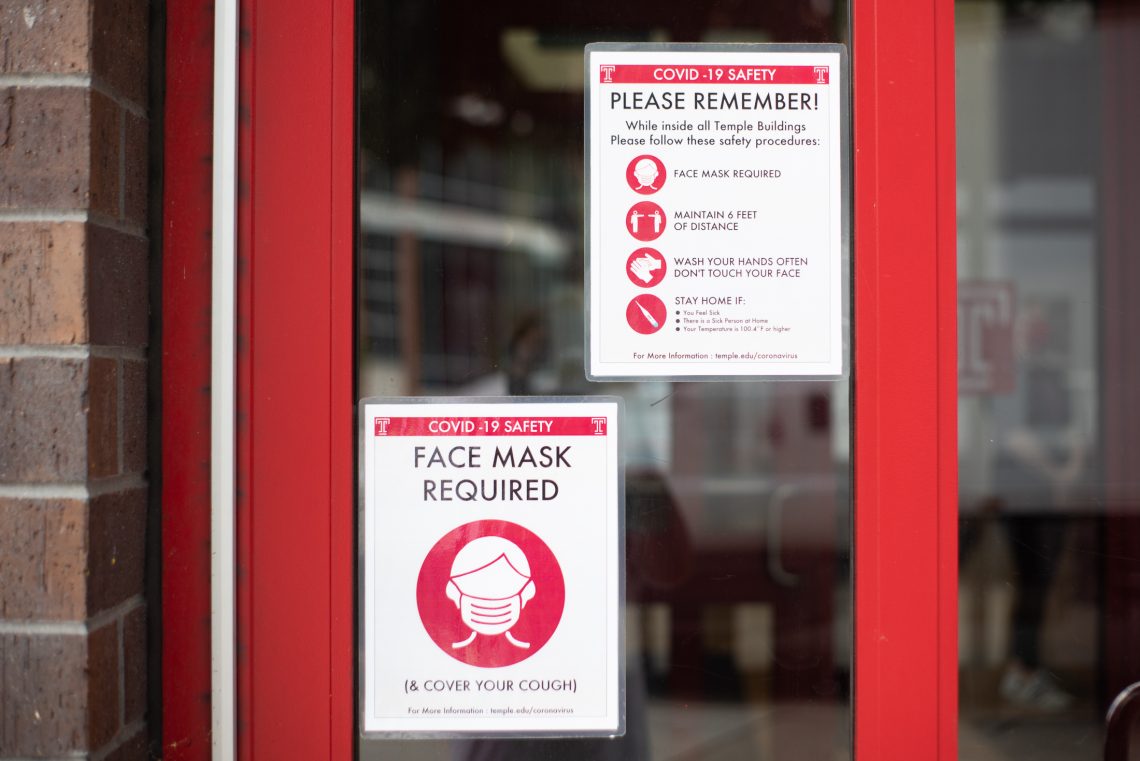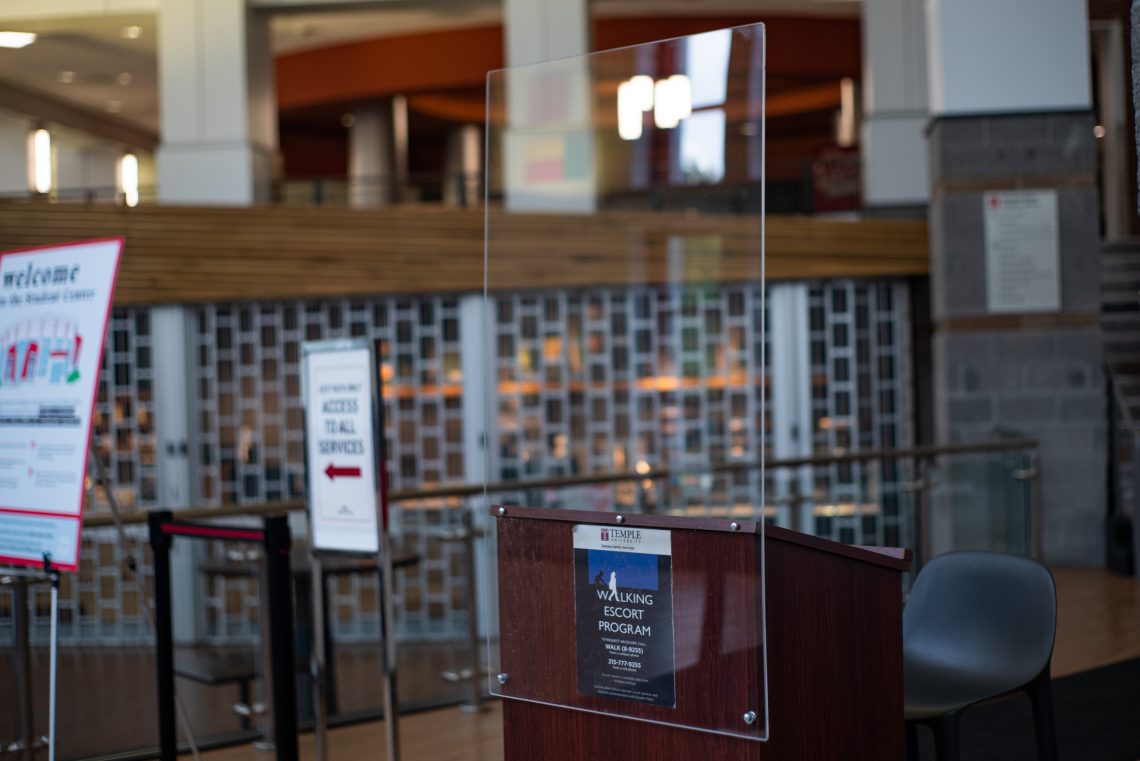
Plexiglass barriers in front of security desks, hand sanitizer stations and circles drawn six feet apart: these now-familiar sights in public areas are coming to Temple University’s Main Campus as the student body prepares to return for the fall semester next month.
As a small cohort of students test in-person classes during the university’s Summer II semester, Temple administrators are planning how to best mitigate the spreading of COVID-19 while reopening campus.
In May, the university announced the creation of the Return Team, a team of representatives from every aspect of campus to meet daily and plan how Temple’s academics, operations, student life, business and research can operate safely in Fall 2020. Last month, Temple said it will reopen campus with a hybrid of in-person and online classes and end in-person operations on Nov. 20, with the potential of moving all classes online if necessary.
Temple outlined four public health “pillars” students will be asked to adhere to: wearing face coverings indoors, washing hands, practicing social distancing and self-monitoring for COVID-19 symptoms. Epidemiologists at the university who spoke to The Temple News emphasized adhering to these guidelines will be vital to ensure a safe return to campus.
“People can be walking in the classroom and never know that they’re infectious,” said Krys Johnson, an epidemiology and biostatistics professor. “It’s really important that we’re all wearing face masks and trying to maintain as much distance as possible starting from the day one of this term because even one day of not doing it can mean a spike in coronavirus cases.”
Among those at the forefront of the university’s planning has been Mark Denys, director of Student Health Services, and Greg Lupinski, director of Campus Operations’ Environmental Health and Radiation Safety.
If there’s anything Denys and Lupinski learned from working to contain the initial outbreak in the spring, it’s to constantly monitor the situation on campus and be willing to change their solutions if necessary, they said.
“Be flexible and expect the unexpected,” Denys added.

TESTING AND CONTACT TRACING
Experts say in lieu of a vaccine, robust contact tracing and widespread testing are key to limiting further outbreak of COVID-19, allowing officials to identify and isolate cases before they spread.
Temple is preparing to test approximately 300 students, faculty and staff a week with tests that can return results within 15 minutes and an additional 1,000 a week with ones that return results in a day, The Temple News reported. All students, faculty and staff displaying symptoms of COVID-19 will be encouraged and given priority to test, but the university will also test as many asymptomatic individuals who are at a high risk of getting the virus as possible.
The university is assembling a team of between 15 and 20 contact tracers who will track infections and advise students to isolate for at least 10 days after their symptoms begin, The Temple News further reported.
“We’re really going to be able to isolate people very quickly and quarantine those who are close contacts of any positive case in a very quick and rapid manner,” Denys said.
Temple is working to implement an online attendance program to record when students report that they are sick, said Jack Sears, a kinesiology professor, who is part of a contingency planning committee for the College of Public Health. Through the program, faculty will send information about students who have reported sickness to Temple’s contact tracing office, Sears added.
SOCIAL DISTANCING
Since COVID-19 spreads primarily among people in close contact with one another, maintaining physical distance of six feet or more between people is essential to slowing the spread of the virus, Vox reported.
Temple stated it will move large classes online and allow some smaller classes to hold a “hybrid” of in-person and online meetings in the fall. Colleges across the United States are taking similar measures to reduce the amount of students on campuses at the same time, Inside Higher Ed reported.
“A lot of the strategies adopted by the university are aimed at decreasing the density of the humans to make transmission much less likely and to try to keep, you know, the Temple community safe,” said Robert Bettiker, a clinical medicine professor at the Lewis Katz School of Medicine and member of the university’s Return Team.
The university is designating areas in classrooms where students can and cannot sit to maintain appropriate distance while some non-classroom spaces will be converted into classrooms to accommodate the number of students on campus, Lupinski said.
Buildings on campus will have floor decals to help students separate six feet from each other, and every security guard station will have plexiglass. The university may also allow students to come into buildings through more entrances than usual to avoid crowding, Lupinski added.
Wearing masks and keeping physical distance from others while returning to campus is essential because nearly 20 percent of COVID-19 cases are asymptomatic, Johnson said.
The need for social distancing has caused changes to some course availability, Sears said.
Some kinesiology classes like volleyball, badminton, karate zumba, aquatic courses involving the school’s now-closed pool and self-defense courses are canceled for the fall since it is impossible to social distance in those classes and keep equipment clean, Sears said.
“The content of the class requires a lot of close contact, which we just can’t do that under the circumstances,” Sears added.

MASKS AND SANITIZATION
On July 1, after a spike in the number of COVID-19 cases throughout Pennsylvania, Gov. Tom Wolf issued an order which requires people wear masks in indoor public spaces and outdoor spaces where it’s impossible to maintain a distance of six feet from others, The Temple News reported.
After Philadelphia didn’t meet its goal to report less than 80 new cases by June 18 for transitioning into the “green” phase of the state reopening plan, the city modified it and scaled back on reopening, The Temple News reported. Until Aug. 1 at the earliest, indoor gatherings of more than 25 people are prohibited and gyms remain closed under the city’s modified version of the “green” phase plan, The Temple News further reported.
It is unclear whether Philadelphia’s “green” phase modifications will change before the beginning of the Fall 2020 semester, which starts on Aug. 24.
Temple will require all students, faculty and staff to wear masks indoors, Denys said. There will be a group of student workers in each building reminding students of the requirement, he added.
If a student refuses to comply with the requirement after being reminded, they will be asked to leave class, Denys said. A student may be referred to the Student Code of Conduct office as a “last resort” if they continue to refuse, he added.
The university hopes that positive peer pressure will compel students to wear masks, Denys said.
“We really want this to be a culture change,” he added.
Temple is considering putting hand sanitizer in every classroom and having disinfectant wipes available to wipe down desks and chairs, Sears said.
WHAT STUDENTS SHOULD DO
Temple will encourage all students to perform a self-check for symptoms each morning before coming to campus, Denys said. The university is exploring several options, including mobile apps, to help remind students, he added.
Aaron Mishkin, a professor at Lewis Katz School of Medicine and an infectious disease physician at Temple University Hospital, said students returning to campus should have a thermometer to check for a fever, one symptom of COVID-19.
“It’s a good practice just to have one around anyway,” Mishkin said.
Since students may be traveling from areas where there is a higher concentration of COVID-19 cases, there is a chance they could bring the virus to Temple and the Philadelphia area, Mishkin added.
“There needs to be a balance in my mind between returning to returning in person instruction, to all of the networking and the things that go along with being on campus, and also keeping everyone safe and continuing to keep the larger Philadelphia community safe as Temple does interact with not just itself but the bigger community,” Mishkin said.
Students should wash their hands, limit how often they touch their face and keep their cell phones clean, Bettiker said.
“In your dorm or wherever you’re staying, try to make sure the high touch areas are clean. Doorknobs, microwave controls, oven handles and also your cell phone,” Bettiker said. “You want to make sure that you wipe back down periodically since we handle those so much.”
Students should also get flu shots once they become available, Bettiker said.
“There are some similarities between the two diseases, influenza and COVID,” Bettiker said. “We also don’t want to be tying up hospital beds and healthcare resources for influenza if we can prevent them.”

WHAT FACULTY THINK
Sears said he’ll feel better about students being on campus once there is a vaccine for COVID-19 or another way to inoculate students.
“I think until we get at that point, I’ll feel much better about it and we can deal with cases,” he added.
While some companies are aiming to have a vaccine ready by January 2021, some experts say that the process could last longer and that it will be distributed in waves rather than to everyone at once, ProPublica reported.
Despite his concerns, Sears said he looks forward to seeing students on campus in the fall.
”We are doing everything we possibly can to make sure that everybody’s safe, but then also has a good experience,” he added.
Johnson said she wants Temple’s reopening plan to follow data from the state and city.
“I understand the desire for us to be back together as a Temple community but I also really want our reopening procedures to be dictated by the data that are coming from the [Pennsylvania Department of Health] and [Philadelphia Department of Health],” Johnson added.
Philadelphia County has averaged approximately 94 new cases a day in the past two weeks, Spotlight PA reported.
As long as everyone works to follow Temple’s mitigation plan for returning, reopening campus is feasible, Bettiker said.
“It looks like it could potentially be doable,” Bettiker said. “There’ll be some mistakes along the way, and we’ll then work to correct those mistakes.”



Be the first to comment